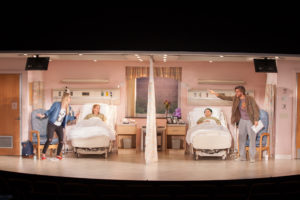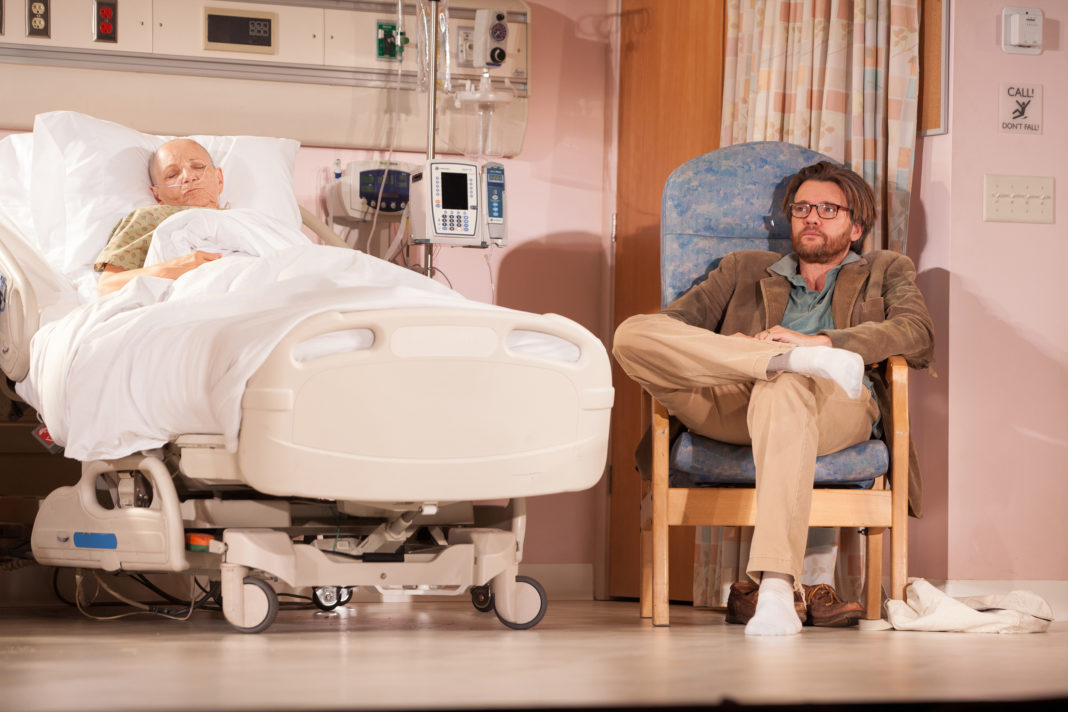If you’ve been watching Ozark on Netflix, you know Jason Butler Harner. Or perhaps you saw him in The Changeling. Or Scandal. Or Ray Donovan. He’s known for playing intense and sometimes villainous characters. For his role as Don in A Funny Thing Happened on the Way to the Gynecologic Oncology Unit at Memorial Sloan Kettering Cancer Center of New York City (now at the Geffen Theatre), he gets to do something different. Be funny, but not just funny.
Harner plays a man whose mother (Eileen T’Kaye) is battling cancer. She shares a room with another patient (JoBeth Williams.) Unbeknownst to him at the start of the play, Karla (Halley Feiffer, who also wrote the play) is visiting her mother and working on some crude comedy bits while her mother sleeps. It’s a romantic comedy filled with pathos and emotional truths about dying and loss. The role allows Harner to flex more of his comedic muscles than he has in a while.
We recently discussed the play and its themes over breakfast in Silverlake. Here’s our conversation.
How did you find out you were going to be playing the role of Don?
I said to Trip Cullman [the director], ‘”Who’s going to be eating Halley’s p****y in LA?” [A reference to a very funny scene in the play.] He said, “Well, I was hoping you would.”

It seems as though Don is a deer trapped in headlights through most of the play. What are the challenges of portraying this character?
He’s like a big sweet moose; trapped in headlights, everything falling apart. Any time a parent dies it is a huge milestone. He’s on his way to divorce and has a business he’s not involved in any more and his teenage son hates him, so he’s directionless and rudderless. This loud mouth girl enters his life. It’s a lot to take on, particularly in a comedy. You start on stage with this backpack of grief and burden and confusion. It’s been an interesting challenge to take those three basic givens and continue to incorporate them every night. Halley’s play, by design, pendulums from large comedy to deep pathos to just wacky zany and you have to go there without attenuating it. It’s only by how fast you can turn them around that the whole impact can happen.
How unique is your experience of acting opposite the playwright?
It’s pretty unique. I adore Halley and I respect her and I want to honor her vision of what she’s written and especially her ear for how she thinks it should go. It’s not without it’s challenges. When you are creating and you are conscious of the way the playwright wants to hear something, you also have to honor what you have inside. I am genuinely proud of how well we communicate and process this challenge together. It’s so rare.
You posted on Facebook how grateful you were to Trip and Halley for trusting you and telling you that you could do this part. How profound were your doubts that you could do the part?
My doubts were so profound that a week before previews I was telling them to call Erik Lochtefeld, who had done the part in New York, and get him to do it here. The main thing is to save the play. It’s good. Halley’s good. That was so embarrassing. I really couldn’t hear Halley or Trip when they said positive things about what I was doing. We had some serious conversations about comic anger versus real anger. Halley and I have this seesaw in Scene 1 where one character has to be angry and then ridiculous and then the other does. They can’t be that at the same time. I’ve spent a lot of time plotting in drama, but in comedy it is tricky and you have to jump over logical thought process. You are extending to the logical absurdity. You have to leap for the net to appear.

Though funny, this play is challenging for audiences to accept humor in dark situations. Do you think the two “healthy” characters are perceived differently by the audience than the dying characters?
You are 1000% right. The audience immediately identifies with the sick people dying. They get full- scale access to say horrific things or do them because they are dying. This is something Halley and I talk about all the time. We had a talkback and this guy who is older was upset with Karla’s response to her mother saying ‘I’m scared.’ She tells a story to her mother because that is the best she can do. Because of their dynamic. It was revealing to me the blind spot for some audience members exactly where their empathy lies. It’s an interesting challenge and also very liberating. It’s another area where I can’t control that.
Jack Lemmon (who it turns out is an idol of Harner’s) said “If you really do want to be an actor who can satisfy himself and his audience, you need to be vulnerable.” If he’s right, and this play certainly requires it, what’s the price an actor pays for doing that?
It’s exhausting on your soul, while at the same time humbling in its magnitude of generosity. But it’s exhausting. That’s the part I think about the most. I aspire to be accessible to an audience the way Jack Lemmon could do. Sometimes I come off exhausted with carrying the burden of this guy. It’s less about ‘look at me, woe is me, I’m a victim’ and more about super simplicity. It’s just me. I hope it rings a bell in your life and you get some moment of respite or epiphany or humanity that makes leaving the theatre a little bit inspiring.
How has doing this play, which you have described as “laughter through tears,” inspired you for the day when you have to deal with mortality the same way the characters in the play do?
Before I started doing this play and it even entered my life, I have been looking at just being passionate and kind to people and specifically my parents. The funny part in doing this play is I really haven’t thought about my parents that much, I think about my grandmother passing more. There’s a beautiful thing that happens in the latter days of someone dying where things just get very simple about life. You’ll go through phases with your family where there are things that weren’t dealt with ideally. They are human and do I want do carry around that much resentment in my life? I don’t. Now I’m at a stage in my life that I just want to be kind to people and allow people the dignity of their own experience.
Updated to include a clarification of a line from the play.
Photo Credit: Chris Witaker












Thank you for capturing the essence of JBH.
Thank you for allowing me to add,
he is a truly fine man and a wonderful son.
His real Mother,
SBW
Sandy Butler Weil